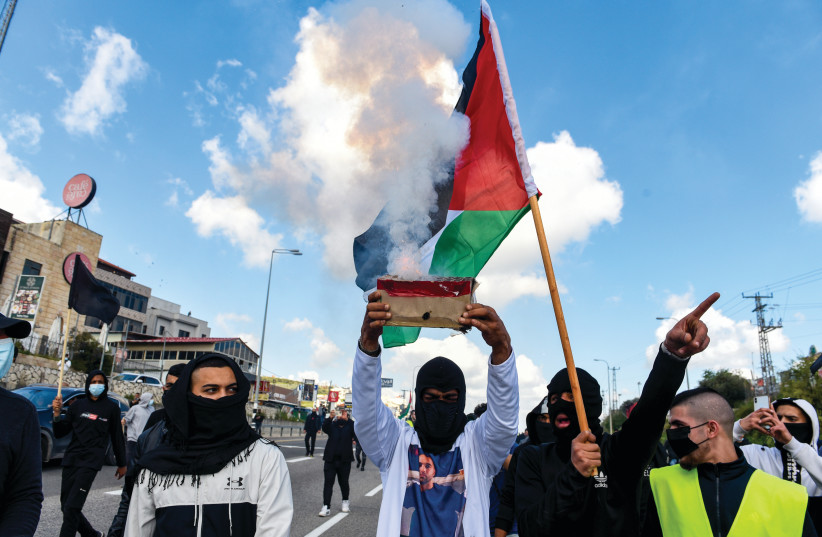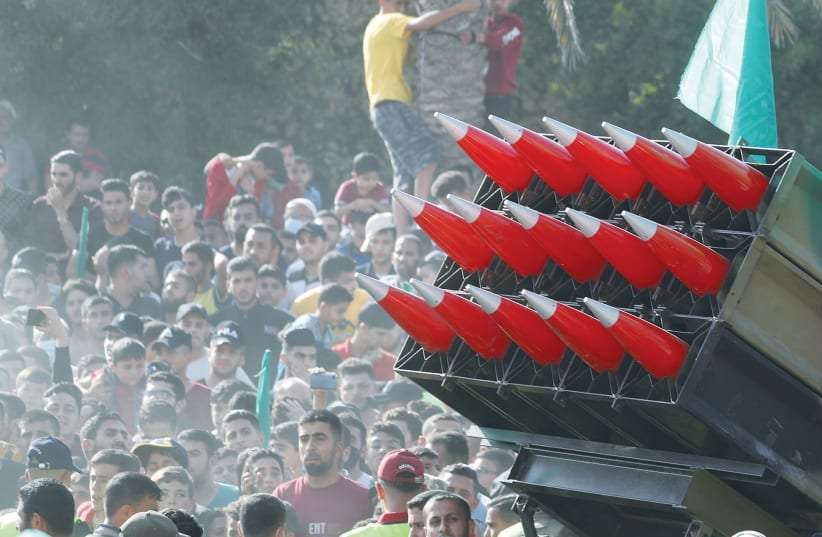‘Hamas issues ultimatum to Israel: Give us $8 million by Tuesday,” screams a 17 October 2021 headline from the Arabic al-Ain newspaper. The money, Hamas says, is to pay its members’ salaries. And this is only one of several demands issued.
Before and during the May 2021 conflict, Hamas repeatedly violated international law (firing missiles into civilian areas, firing missiles from civilian areas, and using civilians as human shields). As reported by the BBC (August 12, 2021), this time, even the left-wing anti-Israel NGO Human Rights Watch had to admit Hamas’s war crimes, thus confirming Hamas’s position as a terrorist organization.
The US, the EU (representing 27 countries), the Organization of American States (a coalition of 35 countries), and other countries worldwide have designated Hamas as a terrorist organization.
However, there is another angle to this story. And if it sounds familiar, perhaps because it has been the plot of many gangster (“gangsta”) or super-villain movies. How about adding “international criminal syndicate” to Hamas’s résumé?
Here are three more recent “criminal” examples:
• “Hamas leader to Israel: Transfer $30m. from Qatar or head to escalation” reads a headline from The Jerusalem Post (June 22, 2021). The article explains that “Hamas plans to escalate tensions with Israel unless it allows Qatar to transfer $30 million to the Gaza Strip to help pay salaries.”


• The Times of Israel (July 29, 2021) ran a headline that said “Hamas warns terror groups may resume rocket fire unless Qatari funds enter Gaza.” This in addition to other threats of fire balloons and violent demonstrations at the border unless monetary demands of Hamas are met.
• Under the headline “Hamas demands more money from Qatar,” an Israel Hayom article of August 21, 2020 stated: Hamas is demanding that Qatar increase the amount of money it sends to the Gaza Strip each month to $40 million, to allow it to move ahead with a number of civilian projects in Gaza.
Notice the use of the words “or else,” “demands” and “ultimatum” versus “request.”
Notice the threats that accompany the “demands.”
Chutzpah? Extortion? Both?
These examples meet the criminal definition of extortion. A word that has been missing in the media when reporting on the topic of Qatari funds being sent to Gaza.
According to the Guide to Financial Crime and Fraud of Investopedia.com: “Extortion is the wrongful use of actual or threatened force, violence, or intimidation to gain money or property from an individual or entity. Extortion generally involves a threat being made to the victim’s person or property, or to their family or friends. While the threat of violence or property damage is commonplace in extortion, it can also involve reputational harm or unfavorable government action.”
A report from Interpol, the inter-governmental police organization, dated September 26, 2018, called “Organized crime underpins major conflicts and terrorism globally” states: “Organized crime is increasingly undermining peace, security and development,” said Mark Shaw, director of the Global Initiative Against Transnational Organized Crime. “It has become a global phenomenon, represented in a confluence of conflicts from Africa to the Middle East and the Americas, and showing a distinct linkage to the response to international terrorism.”
It is important to remember that Israel unilaterally withdrew from Gaza in 2005 leaving behind an infrastructure of agricultural greenhouses that were then immediately looted and destroyed by Gazans, thus even when handed to them, there was practically no industrial base in which to build a new country (NBC News, September 14, 2005). And, the PA and Hamas to this day do nothing in order to “nation build” but continue to demand donations from outsiders.
In his September 15, 2021 Jerusalem Post article “Misuse of Gaza aid is likely to continue,” Eitan Fischberger correctly observes “… that the Palestinian Authority had withdrawn from a deal to transfer Qatari aid to its employees in the Gaza Strip… the retraction stems from the PA’s refusal to funnel the funds through banks belonging to the Palestinian Monetary Authority out of fear that this would expose it to lawsuits and allegations of supporting terrorism…
“This is a tacit admission by the PA that foreign aid it receives is susceptible to mismanagement and diversion to terrorism. This development raises questions about assurances by the international community and NGOs that their aid to Palestinians in the West Bank and Gaza will not be used to facilitate terrorism.”
It is very important to note that the victims of Hamas’s terrorist activities in Gaza deserve assistance and a government dedicated to building an economy. Donors must be assured that money for the Gazans goes to the Gazans themselves and not Hamas. The Gazans will spend the money on food and other necessities, while Hamas has and will spend it on terror tunnels and rockets.
Aside from the fact that Hamas has repeatedly violated international law (firing missiles into civilian areas, firing missiles from civilian areas, and using civilians as human shields), they are also violating a number of Geneva Convention rules on the “Return of the Remains and Personal Effects of the Dead” and the “Release and Return of Persons Deprived of Their Liberty.” Let us not forget: Hadar Goldin, Oron Saul, Avera Mengistu and Hisham al-Sayed.
Now we can add “international criminal syndicate” to Hamas’s résumé. “Gangsta Hamas.” Has a nice ring to it. Hey, Interpol (and other law enforcement agencies), are you listening?
The writer is a former NYC advertising agency and marketing executive, also having spent five years in the financial arena. He is currently semi-retired but continues as an instructor at Rutgers University School of Communication & Information. He made aliyah in 2015. Follow on Twitter @davidslevine
